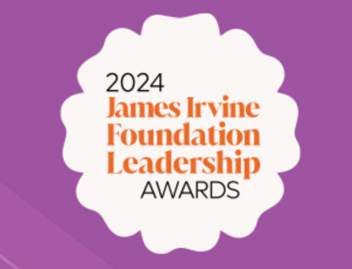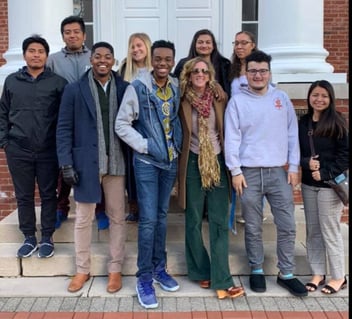Oakland Post: Teacher mentoring program receives James Irvine Leadership Award
 Dean Hector Camacho, Teacher Candidate Tysha Hayes, and the Reach University Admissions & Partnerships Teams at Jefferson Union High School District.
Dean Hector Camacho, Teacher Candidate Tysha Hayes, and the Reach University Admissions & Partnerships Teams at Jefferson Union High School District.
Leaders at Oakland-based Reach University, Dr. Elizabeth Baham and Héctor Camacho Jr, have been honored with the James Irvine Leadership Award for their work on addressing California’s teacher shortage through job-embedded curriculum and credential programs. With the award, each organization receives a grant of $350,000 and additional resources.
Dr. Baham and Mr. Camacho, who have been at Reach for nine years and two years respectively, have been instrumental in attracting and recruiting future educators who otherwise would not have a clear and affordable path into teaching or leadership positions.
Established in 2006, Reach University has served as the nation’s first and only accredited nonprofit university, dedicated to advancing undergraduate and graduate degrees and credentials.
“To be recognized for this work so publicly, has given me more strength to keep [fighting] because it’s a lot of work. I’m super honored and appreciative of [the James Irvine Foundation] for giving me this new burst of energy because it’s a tough field,” Camacho said.
Baham echoed Camacho’s sentiments and is grateful that the work they are doing is being recognized by a larger audience.
“It’s an acknowledgement of the work that I’ve put in and it’s an acknowledgement that teachers matter, that education matters. I think that at the end of the day, people see both Hector and I representing Reach University and they walk away with a sense of teaching matters,” Baham said.
The university primarily partners with K-12 school districts to provide potential teacher candidates who specialize in subjects such as liberal arts, math, science of reading, and computer science.
Camacho, dean of Admissions and SVP of Workforce Development, praised the university’s methodology in allowing candidates already employed in school either part or full time, as a teacher-aides or paraprofessionals, to earn college credit while mastering the art of teaching.
Camacho highlighted the challenges that many face when seeking higher education, such as taking a break from school to work and afford their degree or going directly into college and amassing large amounts of debt to solely focus on their studies.
“Let’s honor and recognize the work that they’re doing in the schools right now. Give them some college credit and then give them the other coursework they need to finish it because we know you shouldn’t have to choose anymore,” Camacho said.
Students at Reach University are paid to earn a degree, and undergraduates take on zero student debt. After grants and institutional scholarships, the out-of-pocket contribution for all full-time undergraduate candidates is $900 per year, or $75 per month, with no student debt, according to Reach officials.
Half of the program candidates are made up of people of color, matching the demographics of the schools they are working in. The large majority are also first-generation college students and some from low-income backgrounds.
Baham, Provost & Chief Academic Officer, stated the importance of having educators of color in classrooms because it not only allows for students of color to see themselves in authority positions, but also integrates what the world looks like for those who are not surrounded by diversity in their everyday lives.
She added that diversity at all levels of academia results in success and encouragement for everyone to strive for more.
“It’s important for [students] to see us occupying spaces where they will want to see themselves,” Baham said.
Reach students are taught in group setting classrooms twice a week and through one-on-one mentoring to better assist with individual needs. This approach allows students to network with other classmates to problem-solve similar obstacles and receive personalized coaching to refine their teaching skills.
With job-embedded curriculum being the set form of learning for Reach, many of the students have a clearer transition from degree to career pipeline. Eighty-four percent of California alumni are still in the classroom five years after completing the graduate program and nearly 91% are still working in a school.
Tysha Hayes, a Reach student, works as a bus driver for Jefferson Union High School District and part-time in the classroom as a part of her degree program. She entered the university in fall 2023 and is hoping to graduate by 2027.
Hayes shared that the non-traditional learning aspect of Reach is what drew her to enroll, as she herself has had an unconventional journey from being a bus driver for 27 years to pursuing a career in education.
The job allows Hayes to be involved in her students’ lives in a more personal way. She explained that her face is the first and last one they see on their way back and forth to school, often prompting them to share their classroom frustrations and struggles with her.
“ The bus has been my classroom with the students, so I get the best of both worlds. I get to see them in different elements throughout the whole day,” Hayes said.
Post-graduation, Hayes intends to work in health and wellness so that she can help guide and assist students who are feeling overwhelmed or unmotivated in their education to work through their struggles and strive for more.
Hayes says although she got a late start in life, the prospect of building interpersonal relationships with her students in and outside the classroom excites her to keep working towards her degree.
Download the full article below or read it here.
Oakland Post-Final-4-10-24.pdf
Download PDF • 50.00MB



